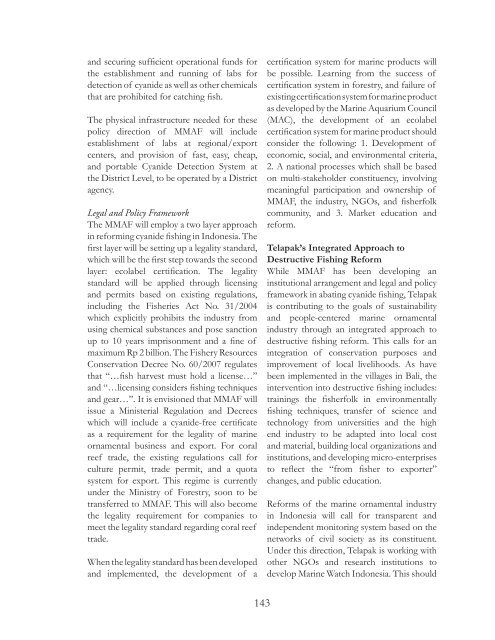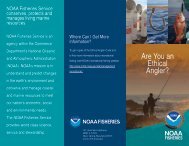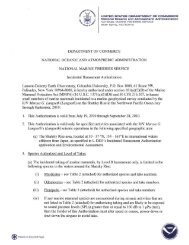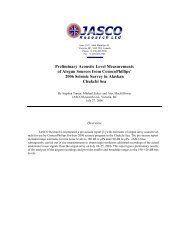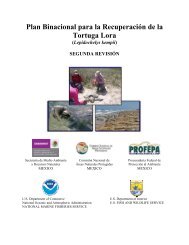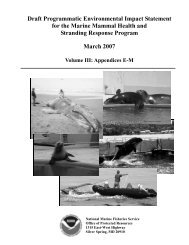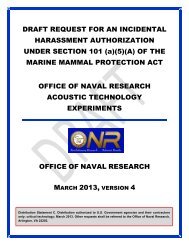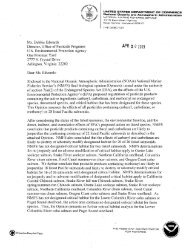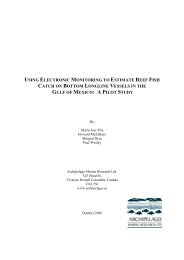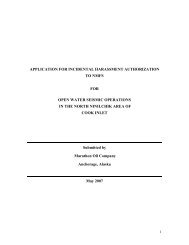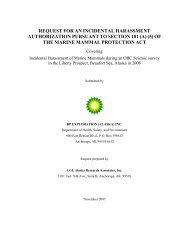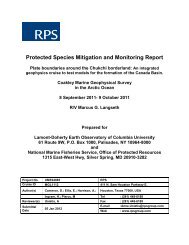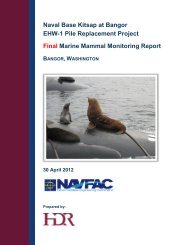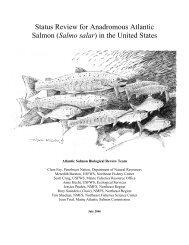Proceedings of the International Cyanide Detection Testing Workshop
Proceedings of the International Cyanide Detection Testing Workshop
Proceedings of the International Cyanide Detection Testing Workshop
You also want an ePaper? Increase the reach of your titles
YUMPU automatically turns print PDFs into web optimized ePapers that Google loves.
and securing suffi cient operational funds for<br />
<strong>the</strong> establishment and running <strong>of</strong> labs for<br />
detection <strong>of</strong> cyanide as well as o<strong>the</strong>r chemicals<br />
that are prohibited for catching fi sh.<br />
The physical infrastructure needed for <strong>the</strong>se<br />
policy direction <strong>of</strong> MMAF will include<br />
establishment <strong>of</strong> labs at regional/export<br />
centers, and provision <strong>of</strong> fast, easy, cheap,<br />
and portable <strong>Cyanide</strong> <strong>Detection</strong> System at<br />
<strong>the</strong> District Level, to be operated by a District<br />
agency.<br />
Legal and Policy Framework<br />
The MMAF will employ a two layer approach<br />
in reforming cyanide fi shing in Indonesia. The<br />
fi rst layer will be setting up a legality standard,<br />
which will be <strong>the</strong> fi rst step towards <strong>the</strong> second<br />
layer: ecolabel certifi cation. The legality<br />
standard will be applied through licensing<br />
and permits based on existing regulations,<br />
including <strong>the</strong> Fisheries Act No. 31/2004<br />
which explicitly prohibits <strong>the</strong> industry from<br />
using chemical substances and pose sanction<br />
up to 10 years imprisonment and a fi ne <strong>of</strong><br />
maximum Rp 2 billion. The Fishery Resources<br />
Conservation Decree No. 60/2007 regulates<br />
that “…fi sh harvest must hold a license…”<br />
and “…licensing considers fi shing techniques<br />
and gear…”. It is envisioned that MMAF will<br />
issue a Ministerial Regulation and Decrees<br />
which will include a cyanide-free certifi cate<br />
as a requirement for <strong>the</strong> legality <strong>of</strong> marine<br />
ornamental business and export. For coral<br />
reef trade, <strong>the</strong> existing regulations call for<br />
culture permit, trade permit, and a quota<br />
system for export. This regime is currently<br />
under <strong>the</strong> Ministry <strong>of</strong> Forestry, soon to be<br />
transferred to MMAF. This will also become<br />
<strong>the</strong> legality requirement for companies to<br />
meet <strong>the</strong> legality standard regarding coral reef<br />
trade.<br />
When <strong>the</strong> legality standard has been developed<br />
and implemented, <strong>the</strong> development <strong>of</strong> a<br />
143<br />
certifi cation system for marine products will<br />
be possible. Learning from <strong>the</strong> success <strong>of</strong><br />
certifi cation system in forestry, and failure <strong>of</strong><br />
existing certifi cation system for marine product<br />
as developed by <strong>the</strong> Marine Aquarium Council<br />
(MAC), <strong>the</strong> development <strong>of</strong> an ecolabel<br />
certifi cation system for marine product should<br />
consider <strong>the</strong> following: 1. Development <strong>of</strong><br />
economic, social, and environmental criteria,<br />
2. A national processes which shall be based<br />
on multi-stakeholder constituency, involving<br />
meaningful participation and ownership <strong>of</strong><br />
MMAF, <strong>the</strong> industry, NGOs, and fi sherfolk<br />
community, and 3. Market education and<br />
reform.<br />
Telapak’s Integrated Approach to<br />
Destructive Fishing Reform<br />
While MMAF has been developing an<br />
institutional arrangement and legal and policy<br />
framework in abating cyanide fi shing, Telapak<br />
is contributing to <strong>the</strong> goals <strong>of</strong> sustainability<br />
and people-centered marine ornamental<br />
industry through an integrated approach to<br />
destructive fi shing reform. This calls for an<br />
integration <strong>of</strong> conservation purposes and<br />
improvement <strong>of</strong> local livelihoods. As have<br />
been implemented in <strong>the</strong> villages in Bali, <strong>the</strong><br />
intervention into destructive fi shing includes:<br />
trainings <strong>the</strong> fi sherfolk in environmentally<br />
fi shing techniques, transfer <strong>of</strong> science and<br />
technology from universities and <strong>the</strong> high<br />
end industry to be adapted into local cost<br />
and material, building local organizations and<br />
institutions, and developing micro-enterprises<br />
to refl ect <strong>the</strong> “from fi sher to exporter”<br />
changes, and public education.<br />
Reforms <strong>of</strong> <strong>the</strong> marine ornamental industry<br />
in Indonesia will call for transparent and<br />
independent monitoring system based on <strong>the</strong><br />
networks <strong>of</strong> civil society as its constituent.<br />
Under this direction, Telapak is working with<br />
o<strong>the</strong>r NGOs and research institutions to<br />
develop Marine Watch Indonesia. This should


